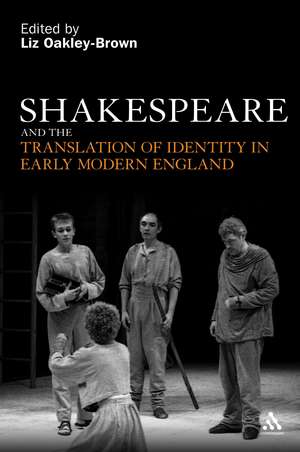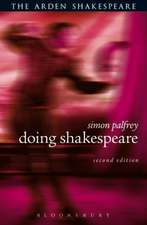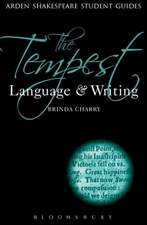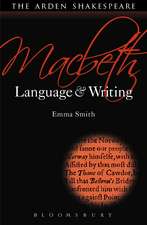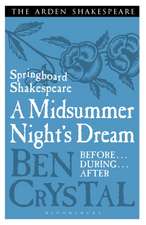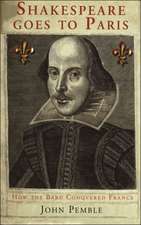Shakespeare and the Translation of Identity in Early Modern England: Continuum Shakespeare Studies
Editat de Dr Liz Oakley-Brownen Limba Engleză Hardback – 13 apr 2011
Preț: 889.49 lei
Preț vechi: 1281.79 lei
-31% Nou
Puncte Express: 1334
Preț estimativ în valută:
170.22€ • 184.84$ • 142.99£
170.22€ • 184.84$ • 142.99£
Carte tipărită la comandă
Livrare economică 22 aprilie-06 mai
Preluare comenzi: 021 569.72.76
Specificații
ISBN-13: 9780826441690
ISBN-10: 0826441696
Pagini: 208
Dimensiuni: 156 x 234 x 13 mm
Greutate: 0.45 kg
Ediția:New.
Editura: Bloomsbury Publishing
Colecția Continuum
Seria Continuum Shakespeare Studies
Locul publicării:London, United Kingdom
ISBN-10: 0826441696
Pagini: 208
Dimensiuni: 156 x 234 x 13 mm
Greutate: 0.45 kg
Ediția:New.
Editura: Bloomsbury Publishing
Colecția Continuum
Seria Continuum Shakespeare Studies
Locul publicării:London, United Kingdom
Caracteristici
Lays out a range of distinctive and original theoretical approaches to early modern translation.
Notă biografică
Liz Oakley-Brown is Lecturer in Shakespeare and Renaissance Writing at Lancaster University, UK. She is author of Ovid and the Cultural Politics of Translation in Early Modern England (2006) and co-editor of Translation and Nation: Towards a Cultural Politics of Englishness (2001).
Cuprins
AcknowledgementsNotes on Contributors Introduction Liz Oakley-Brown 1. Schooling Coriolanus: Shakespeare, Translation and Latinity Barbara Correll 2. A Midsummer Night's Symposium: Translating Platonic Love in A Midsummer Night's Dream Erica Birrell 3. 'Silence! Trouble Us Not!': Travail and Translated Identity in The Tempest Julia Major 4. Harming Macbeth: A British Translation Paul Innes 5. 'Most Retrograde to Our Desire': Translating Recusant Identity in Hamlet Richard Chamberlain Afterword:Ton Hoenselaars Index
Recenzii
'This is an insightful book that opens up Shakespeare studies and extends awareness of the fundamental importance of the concept of translation across time and cultures.'
'Humanism and the reformation were closely intertwined with the Early Modern regime of translation, and the essays in this splendid volume of top-notch criticism demonstrate just how intensely these processes informed the shaping of identities and discourses in the period. The chapters variously use translation as a trope, consider Shakespeare's translated afterlives, or consider the traces left by his classical sources, by the language of Tyndale's Bible, or by the harsh routines of teaching Latin through translation in Elizabeth's grammar schools. All highlight translation as a key concept that reveals fascinating subtexts for Shakespeare and unlocks a range of original readings.'
Shakespeare and the Translation of Identity in Early Modern England is an illuminating collection of five essays that use translation to approach the formation of social, national, religious and gender identities in Shakespeare's dramatic productions... The entire collection of essays will be of great interest and use to those who are primarily concerned with the study of the 'cultural' realities of the Shakespearean universe, as well as those inclined to adopt a more 'linguistic' approach.
'Humanism and the reformation were closely intertwined with the Early Modern regime of translation, and the essays in this splendid volume of top-notch criticism demonstrate just how intensely these processes informed the shaping of identities and discourses in the period. The chapters variously use translation as a trope, consider Shakespeare's translated afterlives, or consider the traces left by his classical sources, by the language of Tyndale's Bible, or by the harsh routines of teaching Latin through translation in Elizabeth's grammar schools. All highlight translation as a key concept that reveals fascinating subtexts for Shakespeare and unlocks a range of original readings.'
Shakespeare and the Translation of Identity in Early Modern England is an illuminating collection of five essays that use translation to approach the formation of social, national, religious and gender identities in Shakespeare's dramatic productions... The entire collection of essays will be of great interest and use to those who are primarily concerned with the study of the 'cultural' realities of the Shakespearean universe, as well as those inclined to adopt a more 'linguistic' approach.
